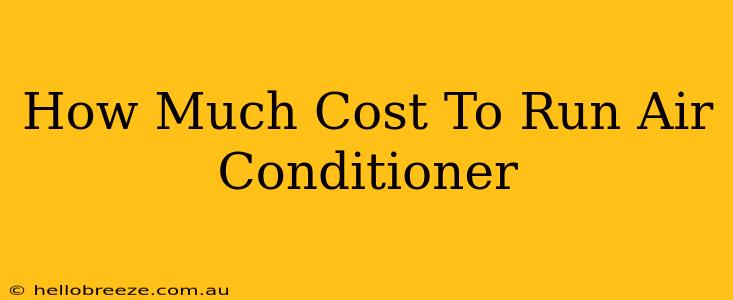Running an air conditioner can significantly impact your monthly energy bill. Understanding the factors that influence the cost is crucial for budget planning and energy efficiency. This guide breaks down the various elements affecting AC running costs and offers tips to minimize expenses.
Factors Affecting Air Conditioner Running Costs
Several key factors determine how much it costs to run your air conditioner:
1. Size and Efficiency of Your Air Conditioner:
-
Size: An air conditioner that's too small will work harder and longer to cool your space, driving up energy consumption and costs. Conversely, an oversized unit might cycle on and off frequently, leading to inefficient cooling and higher bills. Proper sizing is essential for optimal performance and cost-effectiveness. Consider consulting an HVAC professional for a load calculation to determine the appropriate size for your home or office.
-
SEER Rating: The Seasonal Energy Efficiency Ratio (SEER) measures the cooling output relative to the energy input. Higher SEER ratings (13 and above are considered efficient) indicate greater energy efficiency and lower operating costs. Newer, energy-efficient models boast significantly higher SEER ratings compared to older units.
2. Your Electricity Rates:
Your local electricity provider sets the price you pay per kilowatt-hour (kWh). Higher electricity rates translate directly to increased AC running costs. Check your electricity bill for your current rate. Consider exploring energy-saving plans offered by your provider.
3. Climate and Usage:
-
Climate: Hotter and more humid climates require your air conditioner to run longer and harder, significantly increasing energy consumption and costs.
-
Usage: The more you use your air conditioner, the higher your energy bill will be. Strategically using your AC—such as during peak heat hours or only in occupied rooms—can help reduce costs.
4. Home Insulation and Sealing:
Poor insulation and air leaks allow cooled air to escape, forcing your AC to work harder to maintain the desired temperature. Investing in proper insulation and sealing can drastically reduce your energy consumption and, consequently, your costs.
5. Maintenance:
Regular air conditioner maintenance, including filter changes and professional servicing, ensures optimal performance and efficiency. A poorly maintained AC will consume more energy and cost more to operate. A clean filter alone can significantly improve efficiency.
Calculating Your Air Conditioner Running Costs
While a precise calculation requires specific details about your unit and electricity rates, you can estimate your costs using online calculators or by using the following formula:
Cost = (Cooling Capacity (BTUs/hour) / 3412) x Hours of Operation x Electricity Rate ($/kWh)
Keep in mind that this is a simplified calculation and doesn't account for variations in efficiency or usage patterns.
Tips for Reducing Air Conditioner Costs
-
Programmable Thermostat: Utilize a programmable thermostat to automatically adjust temperatures when you're away or asleep.
-
Regular Maintenance: Regularly clean or replace air filters, and schedule professional maintenance annually.
-
Seal Air Leaks: Identify and seal air leaks around windows, doors, and other openings.
-
Improve Insulation: Add insulation to your attic, walls, and floors to improve energy efficiency.
-
Strategic Window Coverings: Use curtains or blinds to block sunlight and reduce heat gain.
-
Energy-Efficient Appliances: Consider upgrading to energy-efficient appliances throughout your home.
-
Ceiling Fans: Use ceiling fans to circulate air and supplement your air conditioning.
By understanding these factors and implementing energy-saving strategies, you can significantly reduce the cost of running your air conditioner and lower your overall energy bills. Remember to consult with HVAC professionals for personalized advice and maintenance.

